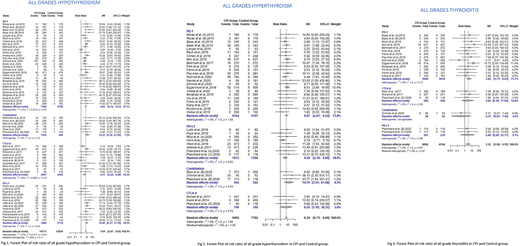Background:
Immune checkpoints, by interacting with their ligands, modify the actions of immune cells. By inhibiting or manipulating this interaction by using checkpoint inhibitors (CPIs), we can harness the powers of the immune system to treat malignancies. CPI targets include PD1, PD-L1, or CTLA-4. CPIs have traditionally been used to treat solid malignancies like melanoma and lung cancer, but recently many trials established efficacy for hematological malignancies. CPIs can cause various immune-related adverse events, and the most significant ones are related to the endocrine system. In this meta-analysis, we will assess the risk of thyroid dysfunctions with CPIs in the light of data from randomized controlled trials (RCTs).
Methods:
We performed a comprehensive literature search on PubMed, Embase, clinicaltrials.gov, and Cochrane databases from inception till July 12, 2020. We used keywords for different checkpoint inhibitors. We used the filter for randomized controlled trials. We screened 9859 articles and selected 48 randomized clinical trials (N=27, 275), that reported the incidence of hyperthyroidism, hypothyroidism, or thyroiditis in CPIs vs. placebo/chemotherapy. Case reports, case series, observational studies, review articles, meta-analysis, single-arm trials, RCTs not reporting data on thyrotoxicity, and RCTs with thyrotoxic drugs in the control group were excluded. Screening and data extraction were done according to PRISMA guidelines. Meta-analysis was performed using the R programming language (version 4.0.2).
Results:
Our literature search yielded 9859 articles. After excluding the articles based on the predefined criteria described above, we included 48 articles and found the incidence of hypothyroidism, hyperthyroidism, and thyroiditis reported in 48, 31, and 18 RCTs, respectively. In 48 RCTs (n=27,275), 14 RCTs (n=7151) had patients with median age ≤ 60 years, while 34 RCTs (n=20,125) had patients with median age > 60 years. 27 RCTs (n= 13,582) used PD-1 targeting CPIs, 8 RCTs (n=5,589) studied CTLA-4 targeting CPIs, 9 RCTs (n= 6,020) involved PD-L1 targeting CPIs and 4 RCTs (n= 2084) used a combination of two CPIs.
In RCTs reporting treatment related hypothyroidism, the total number of patients were 27,275 (CPI arm = 14,771, Control arm = 12, 504). For all grade treatment related hypothyroidism, the risk ratio (RR) was 7.04 [5.47; 9.05, p < 0.0001, I2 = 20%] in favor of control group. Upon subgroup analysis, the maximum RR of 12.25 [5.38; 27.89, I2 = 0%] was seen in RCTs using two CPIs vs. placebo/chemotherapy. For ≥ grade 3 treatment related hypothyroidism, risk ratio was 1.56 [0.94; 2.58, p= 0.09, I2 = 0%] in favor of control group.
In the 31 RCTs (n= 17,257; CPIs = 9495; Control= 7762) reporting hyperthyroidism, the risk ratio for all grade hyperthyroidism was 6.39 [4.71; 8.68, p <0.001, I2= 0%] in favor of control group. Similar to hypothyroidism, maximum risk of hyperthyroidism was also seen in RCTs using combination regimens of CPIs vs. placebo/chemotherapy, RR=14.76 [3.51; 61.98, I2= 0%]. The RR for ≥ grade 3 treatment related hyperthyroidism was 1.38 [0.76; 2.53, I2= 0%].
In the 18 RCTs (n= 10,846; CPIs = 6082; Control= 4764) reporting the incidence of thyroiditis, the RR was 3.12 [1.58; 6.15, p = 0.001, I2= 0%] in favor of control group. The highest risk ratio for thyroiditis was seen in PD-1 targeting checkpoint inhibitors (RR= 3.82 [1.73; 8.43, I2= 0%]).
Conclusion:
Although checkpoint inhibitors significantly increase the incidence of hypothyroidism, hyperthyroidism, and thyroiditis, most of the reported effect was grade 1 or 2 category. CPIs also increased the risk of treatment-related grade ≥ 3 thyroid dysfunctions, but the results were not statistically significant. We recommend that clinicians should be vigilant about autoimmune disorders and routinely monitor patients for thyroid disorders while using CPIs.
Anwer:Millennium Pharmaceuticals: Research Funding; AbbVie Pharmaceuticals: Research Funding; Celgene: Research Funding; Astellas Pharma: Research Funding; Acetylon Pharmaceuticals: Research Funding; Seattle Genetics: Consultancy, Honoraria, Other: Travel, Accommodations, Expenses, Speakers Bureau; Incyte Pharmaceuticals: Consultancy, Honoraria, Other: Travel, Accommodations, Expenses, Speakers Bureau.
Author notes
Asterisk with author names denotes non-ASH members.


